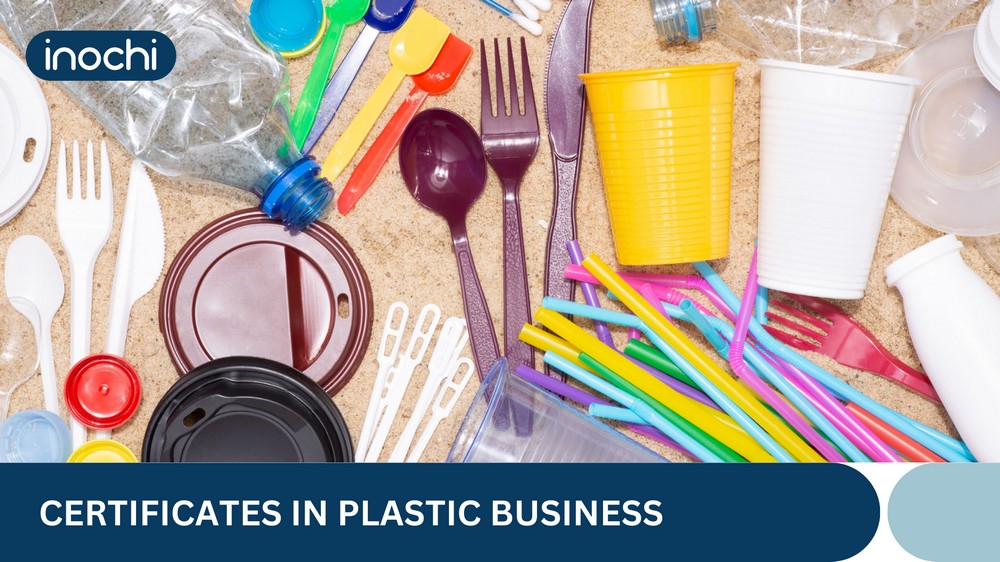The plastics industry is essential to modern manufacturing, but with this importance comes the need for various certifications. Understanding these certifications can enhance product quality, build consumer trust, and ensure compliance with regulations. In this article, we will guide you through the key certifications relevant to the plastics industry, focusing on certificates in the plastics business.

1. The Importance of Certifications in the Plastics Industry
In an industry as dynamic and impactful as plastics, certifications play a pivotal role in shaping business practices and consumer perceptions. They serve as benchmarks for quality and safety, ensuring that products meet essential standards. Understanding the importance of these certificates in the plastics business is crucial for companies aiming to establish credibility and trust in the marketplace. This section will delve into the various ways certifications protect consumer health, the environment, and enhance a company’s reputation.
Certifications in the plastics sector serve multiple critical purposes:
- Protecting Consumer Health: Certifications ensure that products are safe for use, particularly those that come into contact with food or are used in medical applications.
- Protecting the Environment: Many certifications focus on environmental sustainability, helping companies minimize their ecological footprint.
- Enhancing Reputation and Competitiveness: Having recognized certifications can set a company apart from its competitors and build a positive brand image.
- Compliance with Legal Regulations: Certifications help businesses adhere to local and international regulations, avoiding legal issues and potential fines.

The certificates in the plastics business can significantly impact a company’s operations and marketability.
2. Classification of Certifications by Purpose
With numerous certifications available, it can be challenging for businesses to navigate which ones are most relevant to their operations. Classifying these certifications by purpose allows companies to determine which standards align best with their goals and product offerings. This section will explore key categories of certifications – ranging from product quality to environmental management – highlighting their specific objectives and benefits.
2.1. Product Quality Certifications
- ISO 9001: This standard outlines the requirements for a quality management system (QMS). Companies certified under ISO 9001 can demonstrate their ability to consistently provide products that meet customer and regulatory requirements. The primary purpose of ISO 9001 is to enhance customer satisfaction through effective system implementation. By adhering to these standards, organizations not only improve their internal processes but also foster a culture of continual improvement. This commitment to quality can lead to reduced waste, increased efficiency, and ultimately, better products that meet market demands.
- FDA Certification for Food Contact Products: Essential for any plastics that come into contact with food, this certification ensures safety and compliance with U.S. regulations. Obtaining FDA certification is crucial for manufacturers aiming to enter the food packaging market, as it assures consumers that the materials used are safe and do not leach harmful substances. This one of the most important certificates in the plastics business that helps businesses build trust with customers and stakeholders, reinforcing their commitment to public health and safety.

2.2. Factory Certifications
- ISO 14001: This certification focuses on environmental management systems, helping organizations improve their environmental performance through more efficient use of resources and reduction of waste. The goal of ISO 14001 is to minimize environmental impact while maximizing operational efficiency. By implementing an effective environmental management system, companies can not only comply with regulations but also enhance their brand reputation as environmentally responsible entities. This certification encourages businesses to assess their environmental risks and implement strategies to mitigate them, promoting sustainability in their operations.
- OHSAS 18001: This standard provides a framework for managing occupational health and safety, ensuring that work environments are safe for employees. The primary purpose of OHSAS 18001 is to reduce workplace hazards and improve employee well-being. By obtaining this certification, companies can demonstrate their commitment to providing a safe working environment, which can lead to lower accident rates, increased employee morale, and higher productivity. Furthermore, organizations that prioritize health and safety often attract top talent and enjoy a positive public image.
2.3. Environmental Certifications
- GRS and RCS: The Global Recycle Standard (GRS) and Recycled Claim Standard (RCS) verify the content of recycled materials in products, promoting responsible recycling practices. The purpose of these certifications is to ensure transparency in the supply chain and provide consumers with confidence that the products they purchase contain genuine recycled materials. By achieving GRS or RCS certification, companies signal their commitment to sustainability and responsible sourcing, appealing to environmentally conscious consumers and enhancing their market position.
- Carbon Footprint Certification: This certification assesses the total greenhouse gas emissions associated with a product, helping businesses lower their environmental impact. The primary goal of carbon footprint certification is to provide a clear understanding of a product’s environmental footprint, allowing companies to identify areas for improvement. By measuring and reducing emissions, businesses can not only meet regulatory requirements but also demonstrate their commitment to sustainability, which is increasingly important to consumers and investors alike.

2.4. Export and Import Certifications
- Certificate of Origin (CO): This document certifies the country of origin of goods, essential for customs clearance in international trade. The purpose of the Certificate of Origin is to facilitate trade by providing evidence of where a product was manufactured. This certification helps companies navigate tariffs and trade agreements, ensuring compliance with international regulations. By having a CO, businesses can avoid delays in customs and enhance their competitiveness in global markets.
- RóHS Compliance Certificate: This certification ensures that products do not contain hazardous substances beyond permissible limits as defined by European Union regulations. The purpose of the RóHS Compliance Certificate is to facilitate the safe trade of electronic and electrical products by verifying their adherence to safety and environmental standards. Obtaining this certification helps companies avoid import/export issues, enhances their reputation for safety and sustainability, and ensures compliance with international regulations. By having RóHS certification, businesses can access markets in the EU and beyond, thereby increasing their competitiveness in the global marketplace.
Understanding these certificates in the plastics business is vital for any business aiming to thrive in this competitive landscape.
3. Benefits of Having Certifications for Businesses
Obtaining certificates in the plastics business is not just about compliance; it offers a multitude of advantages that can significantly impact a business’s success. From increasing customer trust to expanding market reach, the benefits of certifications are far-reaching. In this section, we will examine how certifications enhance brand value and help companies meet legal requirements, ultimately leading to a more competitive position in the market.
- Enhancing Customer Trust: Certifications reassure customers about the quality and safety of products, fostering loyalty and trust.
- Expanding Market Reach: Many markets require specific certifications for entry, and having them can open new business opportunities.
- Increasing Brand Value: Certifications can enhance a brand’s reputation, making it more attractive to consumers and partners.
- Complying with Legal Requirements: Certifications help businesses stay compliant with laws and regulations, reducing the risk of legal issues.

Incorporating these certificates in the plastics business can provide significant advantages for businesses looking to improve their standing in the market.
In summary, understanding and obtaining the right certificates in the plastics business is crucial for success. From ISO 9001 to FDA certification and environmental standards, these credentials not only enhance product quality but also build consumer trust and ensure regulatory compliance. Businesses should strategically select certifications that align with their products, market demands, and business goals, while continually improving their quality management systems to maintain these essential certifications.





